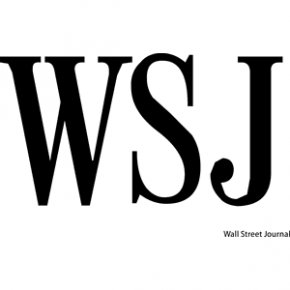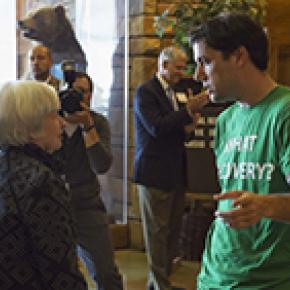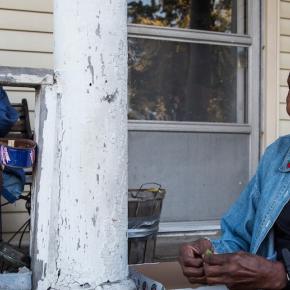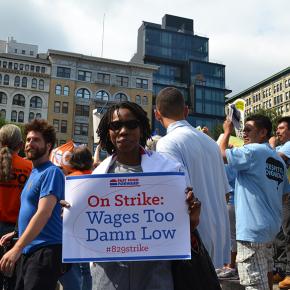Group Blasts Fed for Lack of Diversity in Leadership
Source: Wall Street Journal
Federal Reserve leadership is overly...
Source: Wall Street Journal
Federal Reserve leadership is overly male, almost entirely white and drawn too frequently from the banking community, according to a group critical of the central bank.
A new report from the Center for Popular Democracy’s Fed Up campaign analyzes the types of people populating the Fed’s Washington-based board of governors, the regional bank presidencies and the regional bank boards of directors.
The report notes that all voting members of the central bank’s rate-setting Federal Open Market Committee and nearly all the regional bank presidents are white. Just two of the 12 presidents and two of the five governors are women.
“These key decision-making bodies remain dramatically unbalanced and unrepresentative of the vast majority of people who participate in the economy,” said the group, which has called for more public input into the selection of regional bank presidents and their performance evaluations.
The center said the composition of the Fed’s leadership bodies violates the spirit of the law that created the central bank, which calls for membership drawn from many different industries and interests.
A Fed spokesman responded to the criticism about the regional bank boards by saying the central bank has “focused considerable attention” to finding directors “with diverse backgrounds and experiences” that represent agriculture, commerce, industry, services, labor and consumers, as the law requires.
“We also are striving to increase ethnic and gender diversity,” the spokesman said, noting a rise in minority representation on the boards from 16% in 2010 to 24% today. Female representation has risen from 23% to 30% over the same period, and all told, 46% of regional directors now are either a woman or a member of a racial minority, the spokesman added.
Fed Chairwoman Janet Yellen is the central bank’s first female leader.
The Fed Up group, with a membership drawing heavily from labor unions and community organizations, is a regular critic of the central bank. It has argued in recent months that the Fed shouldn’t raise short-term interest rates and has pressed its case in private meetings with Fed officials. Several of its members appeared outside the central bank’s research conference in Jackson Hole, Wyo., last year to call attention to their views.
The group’s concern about a dearth of diversity at the Fed has been echoed by former Minneapolis Fed chief Narayana Kocherlakota. He argued in a blog post last month the central bank has appeared to give short shrift to racial concerns in part because there have been almost no African-Americans in its policy-making ranks. He wrote that the concerns of racial minorities have been “underemphasized” at the Fed.
The last African-American to serve on the Fed board was Roger W. Ferguson Jr., who served as a governor between 1997 and 2006 and as vice chairman from 1999 to 2006. The first African-American to serve as a Fed governor was Andrew Brimmer, from 1966 to 1974.
The report showed particular concern about the directors on the regional Fed bank boards, which are drawn from the private sector. It said 83% are white, compared with around two-thirds of the total U.S. population.
“The diversity of regional board members is meant to inform the bank presidents, who in turn, participate in discussions and vote at the FOMC,” the report said. “However, the boards, the presidents, and the FOMC fail to represent their region’s racial diversity.”
The report also said its analysis found that representatives of banking and what it calls commercial interests have increased their share of regional Fed board seats in recent years. Representatives of community groups and labor unions account for fewer than 5% of the available board seats, according to the center.
Among the regional Fed bank boards’ most high-profile roles is selecting their bank presidents. Recent regulatory changes now bar directors from participating in that process if their firms are regulated by the bank.
The directors also provide information to bank officials about local economic conditions and give advice on running the banks.
Despite Trump, State Progressives Advance Pro-Worker Policies

Despite Trump, State Progressives Advance Pro-Worker Policies
While the president goes on the attack, Democratic-controlled states and municipalities forge ahead.
...
While the president goes on the attack, Democratic-controlled states and municipalities forge ahead.
Read the full article here.
East Orange Officials Applaud Changes to Mortgage Sale Program Announced by HUD

East Orange Officials Applaud Changes to Mortgage Sale Program Announced by HUD
EAST ORANGE, NJ - The U.S. Department of Housing and Urban Development (HUD) has announced significant improvements to their delinquent mortgage sales program.
The changes include:
...EAST ORANGE, NJ - The U.S. Department of Housing and Urban Development (HUD) has announced significant improvements to their delinquent mortgage sales program.
The changes include:
· Making principal reduction the first strategy in modification processes
Sign Up for E-News
· Increased non-profit participation — with a goal of tripling the number
· Far greater provisions for transparency in the sale process
· A commitment to work with local governments and non-profits on targeted sales
These reforms come on the heels of an aggressive community pressure campaign, led by local elected officials affiliated with Local Progress, a national network of progressive elected leaders, and community groups affiliated with the Center for Popular Democracy.
The East Orange City Council passed a resolution sponsored by First Ward Councilman Christopher James in April 2016 calling on HUD to make reforms along these lines. In September of 2015, Councilman James traveled to Washington, D.C. to join others in meeting with top officials at HUD about this issue.
“This is one giant step in the right direction toward helping residents get back on their feet and rebuilding our communities,” said James. “Mutual understanding of the process and greater transparency will allow us to assist our residents in avoiding foreclosure.” As a city, East Orange has taken aggressive steps to reduce the lingering impact of the foreclosure crisis in its neighborhoods.
“My administration, with the support of the City Council, has taken progressive action to address the foreclosure crisis and stabilize our neighborhoods. In November 2014, we established a Division of Vacant and Abandoned Properties solely dedicated to identifying, registering and collecting fees and fines from agencies, such as banks and other creditors, who violate our city code,” said Mayor Lester E. Taylor III. “With these new reforms, we continue to take advantage of every opportunity – including the enforcement of new state laws – that will help us to revitalize our city, boost property values and restore community pride.”
Last summer, Local Progress members led a successful effort to get a resolution passed at the June meeting of the U.S. Conference of Mayors, calling on HUD to prioritize selling these troubled mortgages to mission-driven purchasers, not Wall Street speculators.
With public events, reports and lobbying, these leaders put HUD, and specifically its head Secretary Julián Castro, in the spotlight for running a program that has been benefitting Wall Street at the expense of communities. HUD’s “Distressed Asset Sales Program” (DASP) has been conducting bulk auctions of delinquent mortgages to the highest bidder, which has meant 98% of these troubled mortgages have been sold to Wall Street speculators. Local elected leaders and stakeholders now plan to make sure that HUD sells delinquent mortgage pools to mission-driven purchasers.
The persistence of local elected officials and community groups has paid off, and the major changes announced last week are proof of their hard work. This campaign proved particularly timely as prominent Wall Street speculator Blackstone has recently become the largest single family landlord in the country. With more homes in the hands of non-profits instead of Wall Street speculators, communities will gain further control over their neighborhoods and be less at the mercy of Wall Street. Leaders from the Center for Popular Democracy and Local Progress plan to continue to apply direct pressure on HUD on this issue, and continue the fight for housing justice and community control to strengthen and protect neighborhoods across the country.
By CONNIE JACKSON
Source
Yellen Says Debate Over When to Hike Now Center Stage
MarketWatch - August 22, 2014, by Greg Robb - With the economy mending, the Federal Reserve’s emphasis is “naturally shifting” to the debate over when to raise interest rates, the head of the U.S...
MarketWatch - August 22, 2014, by Greg Robb - With the economy mending, the Federal Reserve’s emphasis is “naturally shifting” to the debate over when to raise interest rates, the head of the U.S. central bank said Friday.
“With the economy getting closer to our objectives, the FOMC’s emphasis is naturally shifting to questions about the degree of remaining slack, how quickly that slack is to be taken up, and thereby to the question of under what conditions we should begin dialing back our extraordinary accommodation,” Fed Chairwoman Janet Yellen said in a speech opening the central bank’s summer policy conference in Jackson Hole.
Yellen said there was “no simple recipe” for the Fed to follow, but again warned that rate hikes could come sooner than expected if progress in the labor market continued to be more rapid than anticipated or if inflation moves up more rapidly.
Balancing this more hawkish tone, Yellen said 19 labor market indicators followed by the Fed suggest the decline in the unemployment rate overstates the improvement in overall labor-market conditions.
The initial reaction in the stock market was a muted one, with the Dow Jones Industrial Average DJIA, -0.18% trading in a narrow range. Read Market Snapshot
Her comments “skirted around the issue of future monetary policy by noting that whilst there were a number of factors that might mean the labor market was less of a threat to inflation than in previous business cycles, equally, there were factors that might make it more so,” said ING economist Rob Carnell in a note to clients.
Yellen’s remarks about a shift in the Fed debate toward when, and under what conditions to tighten, lend credence to comments earlier this month from Richard Fisher, the hawkish president of the Dallas Fed, who said that the discussion among policy makers at their last meeting had moved in his direction.
Minutes of that meeting released on Wednesday were also judged by Fed watchers to be hawkish.
Perhaps sensing the shift, protestors have arrived for the first time in Jackson Hole this year urging the Fed to delay any rate hike.
Yellen gave no sense a rate hike was imminent. She noted the Fed still thinks that labor-market slack is “significant” and that the central bank has repeated it intends to hold rates close to zero for a “considerable time” after the Fed ends its bond-buying program, expected in October.
But her remarks suggest the first rate hike since 2006 is now on the table for active discussion.
Yellen and her allies on the Fed have signaled the first rate hike won’t happen until after the middle of next year. Hawks on the committee are pressing for an earlier move, and they have been vocal in speaking to reporters at Jackson Hole.
Source
Business Notes: Maryland Among Locations That Could Host 2026 World Cup Games

Business Notes: Maryland Among Locations That Could Host 2026 World Cup Games
“Elected officials across the country are paying close attention to how Amazon and other corporations have responded to Seattle’s efforts to confront their affordable housing and homelessness...
“Elected officials across the country are paying close attention to how Amazon and other corporations have responded to Seattle’s efforts to confront their affordable housing and homelessness crisis,” Sarah Johnson, director of Local Progress, a national association of progressive elected municipal officials, told the Times.
Read the full article here.
The Housing Recovery Has Skipped Poor and Minority Neighborhoods
On October 11, 2009, when Isaac Dieudonne was two years old, his family moved into a new home in Miramar, Florida. As they began to unpack, young Isaac bounded out the...
On October 11, 2009, when Isaac Dieudonne was two years old, his family moved into a new home in Miramar, Florida. As they began to unpack, young Isaac bounded out the front door in search of fun. The parents found him several minutes later, floating dead in the fetid pool of a foreclosed house.
Since the financial crisis began in 2008, approximately 5.7 million properties have completed the foreclosure process, and stories like this begin to answer the critical question of what happens to all those homes. While many are resold, too often they fall into disrepair, creating blight that drags down property values and turns communities into potential deathtraps, attracting not just mosquitoes and mold, but crime and tragedy.
According to expert reports, this neglect occurs disproportionately in communities of color, part of a disturbing pattern. While the Supreme Court has reaffirmed the ability to use the Fair Housing Act to challenge discriminatory effects in neighborhoods, the nation’s neighborhood layout looks more segregated than ever, exacerbating the racial wealth gap. There’s no point in having an anti-housing discrimination law if it isn't vigorously employed to prevent a real societal division that drags down minority families. The Justice Department, free of uncertainty about the Fair Housing Act’s future, needs to work to realize the law's intended purpose.
The housing recovery has skipped more low-income neighborhoods.Fifteen percent of homes worth less than $200,000 are still underwater, where the borrower owes more on the house than it’s worth. This is compared to only six percent of homes over $200,000. Property values in low-income neighborhoods have not bounced back to the degree of their wealthier counterparts.
An important study from Stanford University shows how this housing divide doesn’t align with socioeconomic status, but with race. Middle-class black households are more likely to live in neighborhoods with lower incomes than the average low-income white household. This creates fewer opportunities for minorities, as neighborhood poverty can predict the quality of schooling and the availability of jobs for the next generation. Areport from the American Civil Liberties Union shows that median household wealth for African-Americans continued to drop after the housing collapse, long after median wealth for whites stabilized. They project this to continue well into the next generation, with a drop in the average black family’s wealth by $98,000 more than it would have been without the Great Recession.
Foreclosures are largely responsible for this widening disparity. Predatory lending was directed at minority homeowners. Subprime mortgages weregiven disproportionately to minority borrowers, and after the housing bubble collapsed, these loans failed at higher rates. Racial segregation prior to the crisis turned these neighborhoods into targets, with subprime lending specialists going door-to-door and luring even those who owned their homes outright into refinances with dodgy terms. Banks like Wells Fargo and Bank of America paid fines for pushing minority borrowers into subprime loans, even when they qualified for better interest rates. But these fines—$175 million and $335 million, respectively—were substantially lower than they paid for other bubble-era abuses.
More black and Latino borrowers had their wealth exclusively tied up in their homes, and when they lost them, more of their wealth dissipated. Even after the collapse, the Federal Reserve found that from 2010-2013, net worth of nonwhite or Hispanic families fell 17 percent, compared to an increase of 2 percent for white families.
This wealth transferred in part to Wall Street. Private equity and hedge funds scooped up hundreds of thousands foreclosed properties in low-income communities, and converted them into rentals. This prevented minority homeowners from benefiting from any return in property values, and displaced many from their neighborhoods. And a recent survey of community organizations finds that this has created higher rents and more transient neighborhoods.
The Department of Housing and Urban Development, along with quasi-public mortgage giants Fannie Mae and Freddie Mac, auction off these homes to investors at a discount, according to a study from the Center for Popular Democracy. The U.S. Conference of Mayors recently passed a resolution urging these government lenders to sell instead to non-profits that would work to protect homes from foreclosure.
And then there is the disparate treatment of foreclosed properties repossessed by banks, known as real estate owned (REO). The National Fair Housing Alliance’s findings in 29 metropolitan areas indicate that REO in communities of color are twice more likely to have damaged doors and windows, overgrown weeds and trash on the premises and holes in the roof or structure. This violates the Fair Housing Act: Banks are responsible for maintenance and upkeep on all properties, and if they neglect that in black and Latino neighborhoods, the Justice Department can sanction them.
The failure to maintain foreclosed properties has multiple negative effects for communities. Blight creates health and safety concerns, acts asmagnets for crime, and lowers property values for neighboring homes. It also reduces the tax base for municipalities, as nobody pays property taxes on an empty house. The city of Detroit has already lost $500 million from foreclosures in the past few years; 78 percent of homes with subprime loans are know foreclosed or abandoned.
Last week, fifteen Senate Democrats, including leaders Chuck Schumerand Dick Durbin and ranking member of the Banking Committee Sherrod Brown, asked regulators to open an investigation into the treatment of foreclosed properties. “The same communities of color that were victimized by predatory lending may now be facing the double whammy of racial bias when it comes to the upkeep of foreclosed homes,” said Brown. But policing foreclosed properties would only begin to close the gap between white and non-white neighborhoods.
The entire point of the Fair Housing Act, passed shortly after Martin Luther King’s death in 1968, was to reverse the findings of the Kerner Commission, that the country “is moving toward two societies, one black, one white — separate and unequal.” But reading through these statistics, you wouldn’t know the Fair Housing Act existed. We are further than ever from what Justice Anthony Kennedy described as the act’s “role in moving the Nation toward a more integrated society.” It has been impotent in the face of multiple discriminatory shots at people of color, which has opened up a historically large wealth gap and crippled their opportunity.
Until we figure out another way for the middle class to build wealth other than purchasing a mortgage, the discriminatory effects of our housing system will further a permanent underclass among people of color in America. The Justice Department has an enormous amount of work to do.
Source: The New Republic
Warren says Toys 'R' Us investors should augment worker fund
The toyseller's former private-equity owners said they were forming the fund on Tuesday after months of pressure from former employees and their representatives, along with some public pension...
The toyseller's former private-equity owners said they were forming the fund on Tuesday after months of pressure from former employees and their representatives, along with some public pension funds and lawmakers including Warren, a former Harvard Law School bankruptcy expert who is considering a run for president in 2020. The groups, linked to the Center for Popular Democracy, estimate that workers are owed $75 million in severance pay, and they've also pressed Toys "R" Us creditors including Solus to pitch in.
Read the full article here.
Activists: US Justice Department Response to Baltimore Police Racism Falls Short

Activists: US Justice Department Response to Baltimore Police Racism Falls Short
The response by the US Department of Justice to exposing Baltimore Police Department (BPD) violations of citizens’ constitutional rights falls short of addressing the systemic problem of racism in...
The response by the US Department of Justice to exposing Baltimore Police Department (BPD) violations of citizens’ constitutional rights falls short of addressing the systemic problem of racism in US policing, activists said.
Read the full article here.
Mayoral Hopefuls Cool to Plan to Lift Up Low-Wage Workers
Labor Press - February 13, 2013, by Marc Bussanich - While the city’s economy has been recuperating from the Great Recession, low-wage workers in the city face enormous difficulties in making ends...
Labor Press - February 13, 2013, by Marc Bussanich - While the city’s economy has been recuperating from the Great Recession, low-wage workers in the city face enormous difficulties in making ends meet in one of the nation’s most expensive cities. A new report, Workers Rising, reveals policy decisions the next mayoral administration can make to improve conditions and pay for low-wage workers.
Presented at a symposium on low-wage worker organizing at the Murphy Institute, the authors of the report, UnitedNY and The Center for Popular Democracy, write that the city should raise standards by guaranteeing at least five days of paid sick leave. The city should also regulate high-violation industries, establish a Mayor’s Office of Labor Standards to investigate complaints by workers and pass a resolution that’ll allow the city to pass a higher minimum wage than the state.
According to the report, the city’s economy is shedding living wage jobs, but is adding low-wage, service sector jobs such as restaurants (42,000) and retail trade (27,000).
Prince Jackson works as a security officer for the Air Serv Corporation at Kennedy airport and is part of a committee of security officers organizing for better pay and the appropriate equipment to do their jobs that ensures the safety of passengers.
He worked all night, but said it was important for him to be at the event.
“I’m very tired, but I will do anything that I can do to raise the standards for my fellow workers at the airport.”
Alterique Hall is a retail worker who said he’s behind his rent because he’s paid very low wages.
“It’s difficult. Some days I just want to lie down and cry because I’m being paid and treated poorly. We need to fight for higher wages to better our futures,” said Hall.
A car wash worker who worked for seven years at a carwash owned by John Lage in SoHo, owner of multiple carwashes throughout the city, will soon be laid off because Lage is selling the property to a developer. The workers at the SoHo facility voted to join the Retail, Wholesale and Department Store Union in November, but Lage said the property was up for sale before the election.
Council Member Gale Brewer welcomed the proposal to create a local office for labor standards.
“All the other cities and states that have paid sick leave have such an office. Right now, the only way to get a complaint on many of these issues is on a complaint-by-complaint basis. There isn’t currently any organization; the state doesn’t have enough staff. You need a local office that will be a partner with the employee and employer to come up with safe standards,” Brewer said.
Also joining Ms. Brewer were two mayoral hopefuls—Public Advocate Bill de Blasio and former comptroller and 2009 mayoral candidate, William Thompson. They both said they support the movement to help low-wage workers, but they did not say they would enact the authors’ proposals if elected mayor.
Source
New York Fed Names John Williams President, Bucking Calls for Diversity

New York Fed Names John Williams President, Bucking Calls for Diversity
Progressive groups seized on Mr. Dudley’s retirement as a rare opportunity to influence an economic policy appointment that is outside Mr. Trump’s control. Protesters marched on the bank’s Lower...
Progressive groups seized on Mr. Dudley’s retirement as a rare opportunity to influence an economic policy appointment that is outside Mr. Trump’s control. Protesters marched on the bank’s Lower Manhattan headquarters last month to demand a president who would represent working people. In a statement Tuesday, the Fed Up campaign, a progressive group, criticized the New York Fed’s board for “ignoring the demands of the public and choosing yet another white man whose record on Wall Street regulation and full employment raises serious questions.” The group said the search process “calls into question whether the Federal Reserve can be trusted to act in the public interest.
Read the full article here.











2 months ago
2 months ago